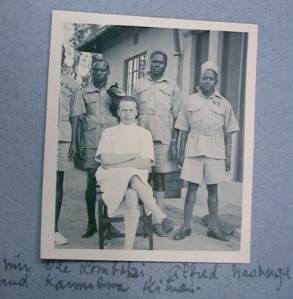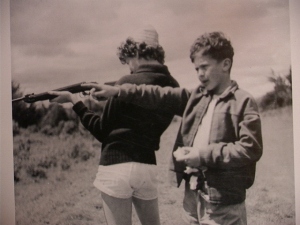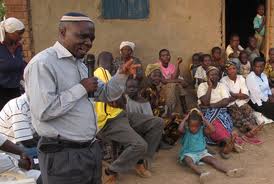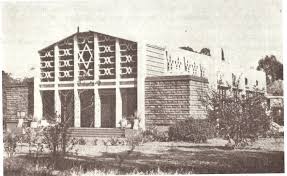Oscar and I are spending a week at Tiwi, just south of Mombasa, where we have rented a two-bedroom spacious house just feet from the beach. The BEACH!!!! This is the same house we rented fifteen years ago when we had a family reunion with my daughter, a friend of hers, my sister and brother, and his daughter and our mother. So as we sit on the veranda reading in the lazy afternoon, I see their shadows flitting softly amongst the fragrant franji pani trees and tiptoeing down the white steps to the beach, where crabs frolic at night and the moon breathes her pulse, in and out, in and out, with every tide.
We do very little except walk, wallow in the lukewarm, turquoise waters of the Indian Ocean, walk again, read and nibble on cashew nuts and mangos. On our very first day, a young beach boy introduces himself as Changani and greets Oscar as an old friend. “Is it you, my brother?” He gives Oscar a high five, but I don’t think my brother recognizes this fellow, so I am a little guarded. The beach boys are a sad nuisance, wandering up and down all day long, trying to sell services of many kinds. “Do you want some madafu? (coconut milk). I will bring you five coconuts and you can have five free – my garden is full of them.” Oscar wants some, but I don’t, but before I can say a word, Changani is racing up the beach to disappear along a village path shaded by tall palm trees. Oscar now remembers that indeed, he does know Changani from the years when he used to come down here to camp at Christmas. Changani used to have dread locks – the insignia of the dedicated beach boy – and now he has shaved his head and wears cool sunglasses. But there is a look of despair in Changani’s eyes. “I am only a beach boy,” he says, sadly. “I want to be something else, but there is no opportunity for me.”
Over the next few days, I get to know Changani quite well and to like him a lot. He is extremely intelligent and speaks quite good German – picked up from tourists whom he takes out in a canoe to snorkel near the reef. I feel sorry for him – he is 32 years old with no future at all but to continue as a beach boy, and of course, like so many other Africans, he has sold his “services” to a young woman from Denmark or Sweden or Holland – someone who came to Kenya on vacation, took a fancy to a cute beach boy, got pregnant and promptly removed herself back home to have the baby and leave her beach boy stranded at low tide.
Most days, Changani has absolutely nothing to do. The tourist industry in Kenya has dropped by over 50% since the troubles in 2008 and besides, it is mid-February, the end of school vacations, so the local holiday season is over. Changani explains to me that he has become the unofficial supervisor for about 12 beach boys at Tiwi. They have divided up the various tourist services among them and once territorial boundaries have been drawn up, they cannot be crossed. For example, Changani cannot sell carvings or cloth at the beach stalls, while his colleagues there may not take tourists to the reef. But they are all desperate for work and he tells me that he often doesn’t eat for two days, or lives only on coconuts. With his girlfriend and son gone for good, he lives with his mother, whom he highly respects and, since he is the first-born son, for whom he feels responsible.
Changani is of medium height with powerful shoulders and his black skin gleams in the sunlight. He does not pester me as I walk along the beach from one end to the other, but waits patiently under the palm tree where he knows I like to rest, and we chat. He is a Digo – a tribe that has lived along the coast for centuries, and who were largely responsible for helping to oust the Portuguese invaders in the 17th century. “Would you like to have a barbeque tonight?” he asks. Oscar and I agree to meet him at 7pm on the beach, and he will cook fish and rice and other coastal delicacies over an open fire. But by 7pm, Changani has not shown up, nor is there any sign of a barbeque fire on the beach. Oscar is pacing the floor and cursing. “He could call!” he mutters. Yes, he could, but he doesn’t. Finally, at 7.45, Changani comes racing up to the front door, clearly deeply agitated. “I am sorry! Sorry!” he cries. “I will make the fire now!” “Why are you so late?” my brother growls. “My sister’s daughter died today from her stomach,” Changani says, “ and I could not come on time, but I wanted to show you that you can trust me, so now I am here.” “Yeah, yeah,” says my brother, clearly implying that he doesn’t believe a word of the story. “Is it true?” I ask him gently. “It is true,” Changani replies. “You could have bloody called!” Oscar yells. “We have no food in the house and have been waiting!” “Don’t talk to him like that!” I hiss at my brother. “The man’s niece just died and all you can think of is your dinner!” “Go to hell!” Oscar screams. “Why are you always interfering? Just fuck off, both of you, and you fuck off and Changani fuck off and just fuck off!”
Well. This is the result not only of Oscar’s frustration after a plane crash slightly damaged his brain, but also of my brother having lived in the bush as the only white man for so long. Like many colonials, he adopts what is to me an insufferable tone of voice and an inexcusable impatience towards African people. However, like all whites in Kenya, he has also been ripped off and robbed so many times by Kenyans that every interaction with them is conditioned by deep mistrust. It is just the way it has always been between the haves and the have-nots.
By this time, Changani has run down to the beach. I follow him with the flashlight and find him sitting on a log, weeping. His brown paper bag with our smelly fish and a pot of gooey rice sits on the log next to him. It doesn’t look too appetizing. I touch Changani on the shoulder. “You should go home,” I say. “We can do this another night. Go on- go home to your sister. You have to understand, my brother is not himself. You remember how sweet he used to be, right?” Changani nods his head.” “Yes, I do. He was my brother,” he says. “But why does he do this to me?” I explain that my brother is prone to fits of rage since the accident, but Changani says “It is because I am poor.” “No,” I tell him. “It has nothing to do with being poor. “ I try to explain the roots of my brother’s reaction. Changani seems to understand, but is visibly distraught. He seems more than ever determined to show that he can be trusted and starts to pile dried palm fronds on the beach for a fire. “No, Changani,” I say. By this time I really don’t want the awful fish and am trying to find ways to heal the events of the awful evening.
Changani does eventually leave, his head hung low, carrying the sorry package of food with him. The full moon lights up the white sand, where thousands of crabs rush in and out of the water, searching for food. They make a dry, rustling sound, parting before Changani’s feet as he passes by, only to close their ranks again behind him. As he heads for the village path, his shadow, sharply outlined on the sand, merges with the trunk of a palm tree and he is gone. Near the steps to our cottage, the franji pani tree is shedding its sweet-scented flowers . They litter the beach, sending their perfume into the balmy night air.
I go back up to the house and Oscar and I manage to have a quiet discussion about the incident. He feels terrible about it even though he still accuses me of interfering. “I was talking to Changani and you just interrupted,” he says. “Yes, “I say, “and I will always interrupt so long as you speak to Africans in that tone of voice.” We then go through the incident measure for measure and I understand that I have somehow usurped my brother’s “authority” while he understands that he has behaved abominally. He is almost in tears and we decide to send Changani a text message of apology, which Oscar does. “Please forgive me,” he writes. “Come and see us tomorrow.”
The next morning, the sky is perfectly blue, the sea perfectly warm, the beach perfectly white and my mind perfectly clear. Changani has mentioned that if he could read and write English, there would be many more job opportunities available to him. There is a school nearby, he has told me, that takes adults like him for special classes. He is very bright, and literate in Kisuaheli, which uses the same alphabet as English, so he is sure he could learn to read and write English very fast. So when I see him on the beach that morning, I ask how much it would cost. “It will be K. Shs. 3000 for a semester,” he replies, “plus some books and a pencil.” K. Shs. 3500 is about $43. Can I afford it? Yes. I hand the money to Changani and he promises to bring me a note from the school to confirm that he has enrolled. He looks a little happier now. Oscar has joined us and Changani says, “My brother, I forgive you. I am very sorry for what happened.” Oscar is also sorry and humbled, and they shake hands – but somewhere, something has been broken. Maybe Changani’s heart? Or Oscar’s self-image? Or the veil of peace fluttering now in tatters about us.
Changani wants a lift to Diani, the next town, where I must go for the Internet. “Why not take him to the school and pay the money directly to the director?” Oscar suggests. “Just to be sure,” he adds. Ah yes – there is that mistrust again. But my brother is right. Could this whole story be just that – a story – to wring cash from my gullible heart? Will Changani really go to school and use the money for the fee?
The school is on the way to Diani so I ask Changani to let me have a look at it. We drive down a sandy path, through village compounds, and come out at a pleasant collection of low buildings of coral stone with window frames painted bright blue. A group of Muslim school girls in blue uniforms with white head veils peek at us from the playground. Changani and I walk to the head master’s office. Mr. Mutabeti greets Changani warmly. “So, my friend, you have come!“ he exclaims, revealing his own distrust. Changani smiles and says, “Yes, sir, I have come.” He hands over the money I gave him which is still tightly rolled in his pocket, and we discuss a few details. Changani will begin at 8am the next day, and will receive three hours a day of one-on-one tuition from the English teacher. He will be treated with dignity and not made to sit among the children or wear a uniform.
Next, we head to a little book store where we buy a picture dictionary in English and Kisuaheli. Changani can read the Kishuaheli easily, and his face brightens at last. We say our goodbyes, for Oscar and I are leaving later that day. “Now I have a brother and a sister!” Changani says. “No,” I say. “I am not your sister. I have just helped you a little bit, that’s all, and I am happy to have done so. Send me a text message in English when you are ready, OK?” “OK, my sister,” he replies, and runs off, jumping from one shady spot to another as the cement walkway is too hot for his bare feet. I am ready to drive off in Oscar’s noisy old truck that belches exhaust fumes and occasionally squeals in agony as rusty parts rub against each other. Changani turns around one more time. “Goodybye and thank you, my sister!” he calls. I stop the car and jump out. “Changani!” I call. “Wait!” I catch up with him under the broad spread of a mango tree. “I am not your sister,” I say. “I don’t want you to call me your sister, OK? I am just a friend.” Changani looks a little dismayed but he understands. Being his “sister” puts me under lifelong obligations of support. Being his friend is entirely different. I can choose to help him further or not. “OK,” he says, and holds out his hand. “Thank you my friend.” We shake hands and I drive off, excited to receive Changani’s first text message in English whenever he’s ready.



